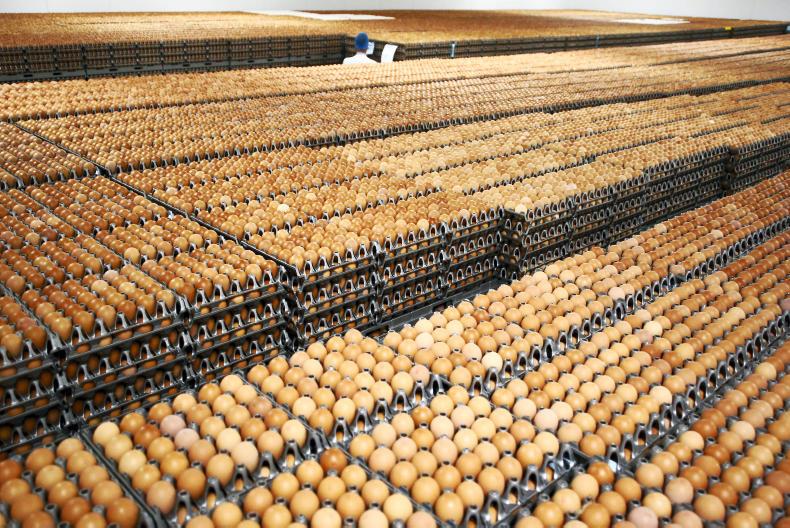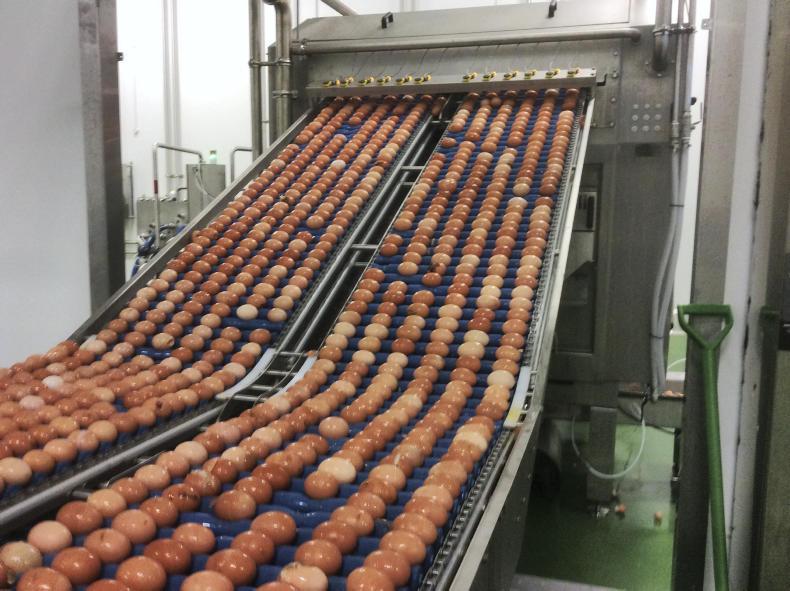With over 40 years of experience working with eggs, Fermanagh man Charles Crawford is well placed to comment on the future prospects for the industry across the island.
In general, he is confident, with the key market in Britain about 87% self-sufficient and showing 12 years of positive consumption growth.

Charles Crawford, managing director of Ready Egg Products.
There is also increasing recognition among health professionals about the positive benefits of eating nutrient-rich products such as eggs,and with some people switching away from meat, eggs are firmly back in fashion.
Crawford is managing director of Ready Egg Products Ltd, a business originally set up in 2007 as a joint venture between the Crawford-owned Erne Eggs, Irish Egg Products and Greenfield Foods. Monaghan-based Greenfield Foods, the largest egg producer and packer in the Republic of Ireland, still hold a stake in Ready Egg Products, with the remainder of the business owned by the Crawford family.
Profit
It is a business that continues to grow quickly, recording 11% growth in turnover in 2018, reaching £71.73m. Profit after tax stood at £6.71m.
Based in Lisnaskea, Co Fermanagh, and with £7m spent on a new factory in Chesterfield, England opened in 2015, the total business handles 4m eggs per day, produces 1,000t of egg products every week and employs over 160 people.

Ready Egg Products opened a new processing site at Chesterfield, Derbyshire, England, in 2015.
It is the largest egg processing business in the UK.
The company mostly services the foodservice and food manufacturing sector in Britain with liquid, hard boiled and scrambled eggs.
“Our next big investment at Lisnaskea – we are currently building a new drying plant to produce dried and powdered egg products for use in the bakery sector,” said Crawford.
The company also keeps 375,000 birds in enriched cages at the Lisnaskea site
Eggs used in the business come from around 40 direct farmer suppliers, the majority of whom operate within 20 miles of the main base in Lisnaskea. The company also keeps 375,000 birds in enriched cages at the Lisnaskea site, with additional eggs for processing bought from egg packers across Ireland.
The eggs processed at Chesterfield are either English eggs or eggs brought in from the continent.
Free range
Looking to the future, UK retailers said in 2016 that they would stop sourcing eggs from caged systems by 2025, which is driving change within the industry.
Over half of all hens in the UK are now in free range systems, and in NI the figure is over 60%.
“I think caged eggs have another five years, and possibly up to 10. There has been talk that they might be banned in the UK, but aside from that, no-one is investing in cages, so they won’t last.”

Ready Egg Products is the largest egg processing business in the UK.
His advice to any producer thinking of converting from cages is, where possible, to go for free range rather than a barn system.
“Free range is the future. We must produce what the market wants.”
The continued growth of Ready Egg Products creates other issues. To meet future demand and service the new drying plant, Crawford reckons the business could handle eggs from another 1m birds.
The poultry industry is a big success story in NI
But in NI, concerns about ammonia emissions from livestock systems have made it extremely difficult for farmers to get planning permission for new houses. Effectively, expansion is on hold,and with the continued lack of government at Stormont, there is no sign of the situation changing soon.
“Our government officials and politicians have a decision to make. Do they want those hens to be in the likes of Poland and Romania, or here in NI? The poultry industry is a big success story in NI,” said Crawford.
We would like to look at houses with up to 60,000 free-range birds. We have got to compete
He also believes that the industry needs to consider how it can remain competitive, which potentially means building larger, more efficient units.
At present, the British Egg Industry Council (BEIC) Lion Code, restricts free range units in the UK to a maximum of 16,000 birds per house. “We would like to look at houses with up to 60,000 free-range birds. We have got to compete,” he said.
Contracts
On the issue of contracts in the egg sector, he warns farmers to be cautious. While the British Free Range Egg Producers Association (BFREPA) has been pushing for updated and legally binding contracts between farmers and packers/processors, the Ready Egg Products business has traditionally been based on trust between both parties.
“We have got to make a profit and our farmers have to make a profit. We know we need each other. I fear these egg contracts are an accident waiting to happen,” Crawford said.
Read more
Cheap import concerns in UK egg sector
Silver Hill growth a lesson for Ireland’s agri-food industry
Global shortage in meat and dairy to 2023
With over 40 years of experience working with eggs, Fermanagh man Charles Crawford is well placed to comment on the future prospects for the industry across the island.
In general, he is confident, with the key market in Britain about 87% self-sufficient and showing 12 years of positive consumption growth.

Charles Crawford, managing director of Ready Egg Products.
There is also increasing recognition among health professionals about the positive benefits of eating nutrient-rich products such as eggs,and with some people switching away from meat, eggs are firmly back in fashion.
Crawford is managing director of Ready Egg Products Ltd, a business originally set up in 2007 as a joint venture between the Crawford-owned Erne Eggs, Irish Egg Products and Greenfield Foods. Monaghan-based Greenfield Foods, the largest egg producer and packer in the Republic of Ireland, still hold a stake in Ready Egg Products, with the remainder of the business owned by the Crawford family.
Profit
It is a business that continues to grow quickly, recording 11% growth in turnover in 2018, reaching £71.73m. Profit after tax stood at £6.71m.
Based in Lisnaskea, Co Fermanagh, and with £7m spent on a new factory in Chesterfield, England opened in 2015, the total business handles 4m eggs per day, produces 1,000t of egg products every week and employs over 160 people.

Ready Egg Products opened a new processing site at Chesterfield, Derbyshire, England, in 2015.
It is the largest egg processing business in the UK.
The company mostly services the foodservice and food manufacturing sector in Britain with liquid, hard boiled and scrambled eggs.
“Our next big investment at Lisnaskea – we are currently building a new drying plant to produce dried and powdered egg products for use in the bakery sector,” said Crawford.
The company also keeps 375,000 birds in enriched cages at the Lisnaskea site
Eggs used in the business come from around 40 direct farmer suppliers, the majority of whom operate within 20 miles of the main base in Lisnaskea. The company also keeps 375,000 birds in enriched cages at the Lisnaskea site, with additional eggs for processing bought from egg packers across Ireland.
The eggs processed at Chesterfield are either English eggs or eggs brought in from the continent.
Free range
Looking to the future, UK retailers said in 2016 that they would stop sourcing eggs from caged systems by 2025, which is driving change within the industry.
Over half of all hens in the UK are now in free range systems, and in NI the figure is over 60%.
“I think caged eggs have another five years, and possibly up to 10. There has been talk that they might be banned in the UK, but aside from that, no-one is investing in cages, so they won’t last.”

Ready Egg Products is the largest egg processing business in the UK.
His advice to any producer thinking of converting from cages is, where possible, to go for free range rather than a barn system.
“Free range is the future. We must produce what the market wants.”
The continued growth of Ready Egg Products creates other issues. To meet future demand and service the new drying plant, Crawford reckons the business could handle eggs from another 1m birds.
The poultry industry is a big success story in NI
But in NI, concerns about ammonia emissions from livestock systems have made it extremely difficult for farmers to get planning permission for new houses. Effectively, expansion is on hold,and with the continued lack of government at Stormont, there is no sign of the situation changing soon.
“Our government officials and politicians have a decision to make. Do they want those hens to be in the likes of Poland and Romania, or here in NI? The poultry industry is a big success story in NI,” said Crawford.
We would like to look at houses with up to 60,000 free-range birds. We have got to compete
He also believes that the industry needs to consider how it can remain competitive, which potentially means building larger, more efficient units.
At present, the British Egg Industry Council (BEIC) Lion Code, restricts free range units in the UK to a maximum of 16,000 birds per house. “We would like to look at houses with up to 60,000 free-range birds. We have got to compete,” he said.
Contracts
On the issue of contracts in the egg sector, he warns farmers to be cautious. While the British Free Range Egg Producers Association (BFREPA) has been pushing for updated and legally binding contracts between farmers and packers/processors, the Ready Egg Products business has traditionally been based on trust between both parties.
“We have got to make a profit and our farmers have to make a profit. We know we need each other. I fear these egg contracts are an accident waiting to happen,” Crawford said.
Read more
Cheap import concerns in UK egg sector
Silver Hill growth a lesson for Ireland’s agri-food industry
Global shortage in meat and dairy to 2023









 This is a subscriber-only article
This is a subscriber-only article










SHARING OPTIONS: